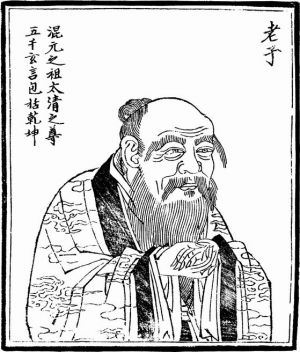Laozi
Laozi (老子 also translated as Lao-tzu) was Chinese philosopher of the late Spring and Autumn Period and founder of Taoism.
Whether he was the true author of the book Dao De Jing (Classic of the Way and Virtue) has long been in dispute. However, the majority of scholars tend to believe that the book reflects his thinking. Laozi used the concept of the "Dao" (Way) to explain all changes in the universe, and put forward dialectical ideas such as "Dao gives rise to one, one gives rise to two, two gives rise to three and three gives rise to all other things", "All things under Heaven came from something which in turn came from nothing" and "Good fortune lies within bad, bad fortune lurks within good". In aesthetics, he advocated the concepts of "Great sound is rarely heard" and "Great images have no forms". The theory of Laozi exerted a great impact on the development of philosophy in China, and later scholars made use of his thinking in various ways. The Dao De Jing has been translated into many languages. Apart from its philosophical views, the moral principles standing for universal love as expressed in the following words "To honor others' aged people as we honor our own; and to be kind to others' young as we are to our own" are often quoted with approval by people today.
